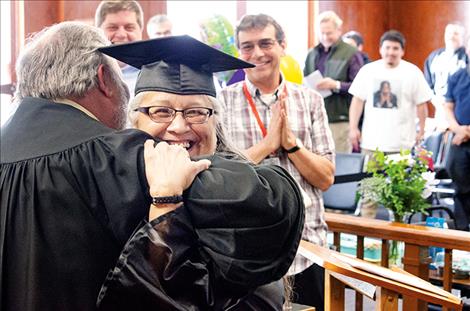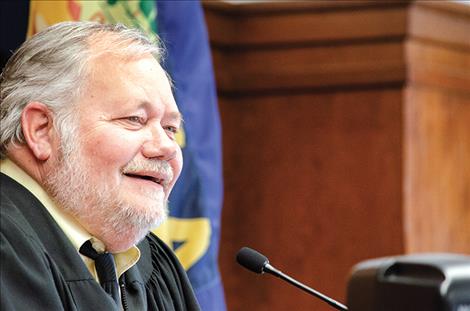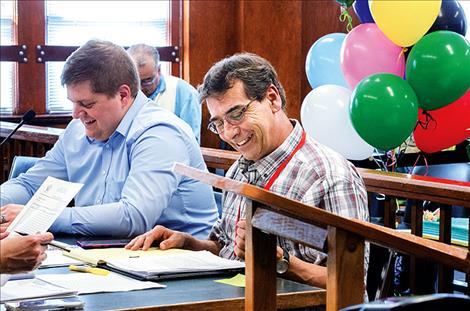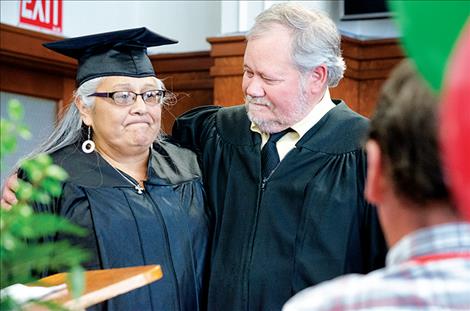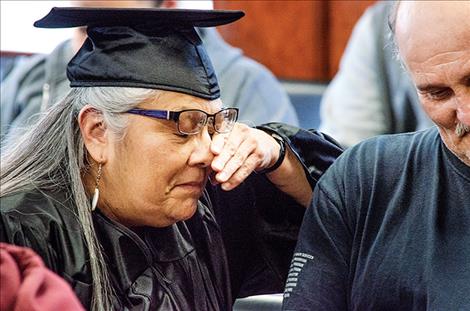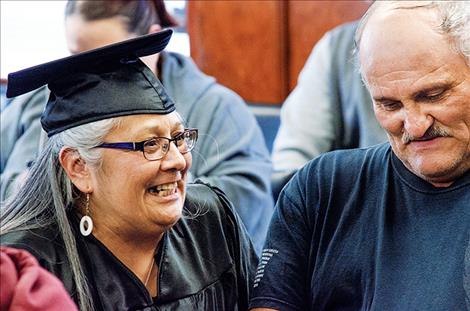Drug Court celebrates successful first year
Hey savvy news reader! Thanks for choosing local.
You are now reading
1 of 3 free articles.
POLSON – In an effort to keep people from continuously cycling in and out of the criminal justice system, a drug court for Lake County was a developed with a focus on helping people create a new life for themselves.
On Thursday, April 11, Lake County Drug Court celebrated its seventh graduate and a successful first year as a new program. Susan Pierre stood in front of a courtroom wearing graduation attire and thanked program participants, friends, family and officials for their support. She started the program about a year ago and has done so well that she was appointed the guardian for her grandchildren.
Participating in drug court changed her life. She said she started out with a defensive attitude, made a lot of excuses and wanted to quit. She finally decided she was tired of the life she was living.
“Drug court has given me the opportunity to live a life in recovery and to shine,” she said. “I’ve learned to appreciate my life and the course it has taken. Now, I think I can make a difference for my family.”
She said her probation officer referred her to drug court. “If probation hadn’t believed in me, I probably would have given up a long time ago,” she said. “I know I asked them once or twice to just send me to prison (because drug court was difficult). But I’m glad that they didn’t.”
About 60 people have participated in drug court since it began. Due to funding, the program caps out at 30 people a year. Don Roberts, addiction counselor, works with participants and leads group counseling sessions for the court. He said only one of the graduates is struggling to keep on track.
Jay Brewer, drug court coordinator and licensed addiction counselor, regularly reviews the data on participants. He said recent data shows that forty-five percent are male and 54 percent are female. Most of the participants are 30 to 40 years old. The next highest average was in the 20-30 age group. Methamphetamines were the drug of choice for 47 percent of the group.
Twenty-three people are currently in the 12-24 month program that involves regularly appearing in front of Judge James Manley along with counseling sessions, drug testing and getting a job or education.
“It’s about putting all the pieces together, including health, housing, education and therapy,” Brewer said. “In therapy, we tackle the underlying issues because no one wakes up in the morning and says, ‘I think I’ll become an addict today.’ There are other things that need to be dealt with so people can stay clean.”
Manley requires participants to get job training or education so they can work towards making enough money to be above the poverty level. “People relegated to poverty have a harder time succeeding,” he said from the bench.
Brewer said the program is having a positive impact on people’s lives. Nic Stasso finished the program earlier this year. When he was referred to the program, Manley said he was advised during the application process that Stasso couldn’t succeed in Drug Court and needed something more like inpatient treatment, but Stasso wanted to try. Manley agreed to give him a chance. “He is the guy who proved us wrong and succeeded,” Manley said of Stasso.
Stasso also said the program wasn’t easy, but the thought of going to jail for 10 years if he went through the regular court system was a good motivational tool. Living in a small town made recovery difficult. He said he would see friends and it would trigger his cravings, so he had to end many relationships. “I basically had to hibernate for a while until I could find new friends,” he said.
Several participants weren’t thrilled about being in the program. One man stood in front of the judge during a regular visit and said he didn’t want to be there, but he did want a better life. Manley had the man attending 14 meetings in 14 days to help focus his mind on treatment.
A Federal Justice Department grant for $399,000 funds the program, which is to be spread over three years and is currently in the second year. A $50,000 grant from the Gianforte Family Foundation helped get the court started. After the federal grant runs out in 2020, a grant from the State Legislature will kick in.
In the future, Brewer would like to see a “sober living” housing facility developed for people in Drug Court so they don’t end up doing things like couch surfing from one place to the next and finding situations where they are tempted to relapse. He said transportation was also needed to help people.
Ruben Quintana, who is working on getting his addiction-counseling license, said housing is the biggest struggle people face as they work on recovery. He said people often have to change their living situations so they can get clean but they have a way to do that.
Manley thanked the local businesses for helping support Drug Court, including Pier 93 for providing gas cards for participants, the Cove Deli, Scottage Cakery and the Lake City Bakery for providing food. Brewer began handing out slices of cake and saying it was a celebration to see another person graduate.















